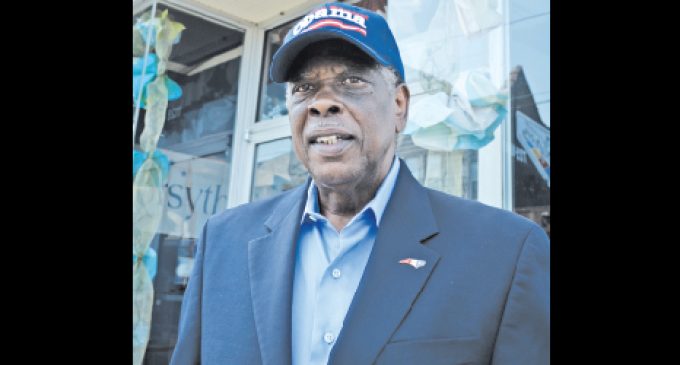Community advocates see good, bad in state of black leadership

The heat has been on local African American elected officials – particularly those on the City Council and Forsyth County Board of Commissioners – this year. From the debate over the city’s selling of public venues, to the backlash created by the county’s latest property revaluations, elected leaders have had to answer directly to their constituents, who have sometimes praised but most often pounced on the decisions that have been made.
“Every city worth its weight in gold has a coliseum, has some kind of public facility. I was on the (Winston-Salem) Public Assembly Facilities Commission, and there are some concerns about that facility without a doubt, but it would be nice if we could find a way to overcome those concerns rather than sell it,” the Rev. Paul Lowe, pastor of Shiloh Baptist Church and the Democratic Party’s Fifth Congressional District Chair, said of the recent 5-2 vote by the City Council to sell the Lawrence Joel Veterans Memorial Coliseum to Wake Forest University and Bowman Gray Stadium to Winston-Salem State University.
City leaders have cited the high cost of maintenance and the pricey repairs needed at the venues as the reasons for the sales. Although Wake Forest has agreed to maintain the coliseum as a public venue, Lowe believes that selling the property will make the city less desirable as a travel destination. Community activist Marva Reid agrees.
She said she understood the need for the city to unload a source of debt, but she is concerned that the sale of the coliseum could hurt the city’s bottom line down the road.
The coliseum and stadium deals aside, community leaders like Reid say they want their leaders to be more proactive.
Reid, the chair of the East/Northeast Winston Neighborhood and the Ashley Precinct, believes city and county leaders haven’t done enough to address African American unemployment rates or cut spending.
“I am disappointed that since we’ve been through the sequester, I really don’t see the city cutting back,” she said. “…They’ve been asking us (as citizens) to sacrifice and they need to sacrifice, too.”
Phillip Carter, a longtime community advocate, pointed out that only two members of the City Council, the East Ward’s Derwin Montgomery and the Southeast Ward’s James Taylor, were outspoken in their opposition to the Council’s decision not to file an amicus brief on behalf of Kalvin Michael Smith, a local black man who many believe has been wrongly convicted of a gruesome 1997 beating of a white woman, Jill Marker.
Carter thinks that Taylor has also shown strong leadership in his efforts to increase minority participation in city government contracts. Taylor, who has served on the Council since 2009, led the charge to implement a 10 percent minority/women-owned businesses participation minimum requirement for City contracts.
Albert Porter, the venerable Democratic Party stalwart and community activist, said Forsyth’s only black (and Democratic) commissioners, Walter Marshall and Everette Witherspoon, could have better prepared their constituents for this year’s property revaluations, which saw the tax value of 93 percent of properties countywide dip. The two commissioners held public meetings around the start of the year to allow community members to sound off about the changes in property values, but failed to notify them beforehand that the changes were on the horizon, Porter said.
“The County Commissioners were briefed about this revaluation,” stated Porter, a member of the Forsyth County Democratic Party, the African American Caucus and the local NAACP. “The first thing I would’ve asked (as a Commissioner) is ‘How would this affect the people?’ If the people would’ve known even before Christmas, we could’ve started having meetings and do something to either protest it or get the revaluation thrown out.”
All the members of the City Council, including Mayor Allen Joines, are up for reelection this year. Porter said it is up to citizens to get engaged and involved as Election Day approaches by making their voices heard at community meetings and holding representatives accountable for their actions.
“Our people are so uneducated about the political process. We could be moving forward politically if they would even attend a meeting,” he remarked. “We’re not showing up for things that are important.”[/pullquote]
Naomi Randolph, the former executive director of Neighbors for Better Neighborhoods, said black elected officials have done a “relatively good” job of hearing and addressing the major concerns that have been voiced by community members.
“My belief is that, relative to the issues people know about, relative to the elected leadership, people try to be responsive,” said Randolph, the owner of Insight Consulting Services.
Randolph said she would like to see elected officials do more to help grassroots leaders assemble and establish unified positions on issues that are representative of the communities they serve. By interfacing with community leaders, political leaders could gain greater insight into the needs of their constituents and the underlying issues that concern them, Randolph said.
“I think we have to make a decision collectively to say we are doing good, but we could certainly be doing better,” she said, referencing both citizens and political leaders. “We all have to do a better job of getting out of our individual boxes and working collectively to affect some positive change.”













